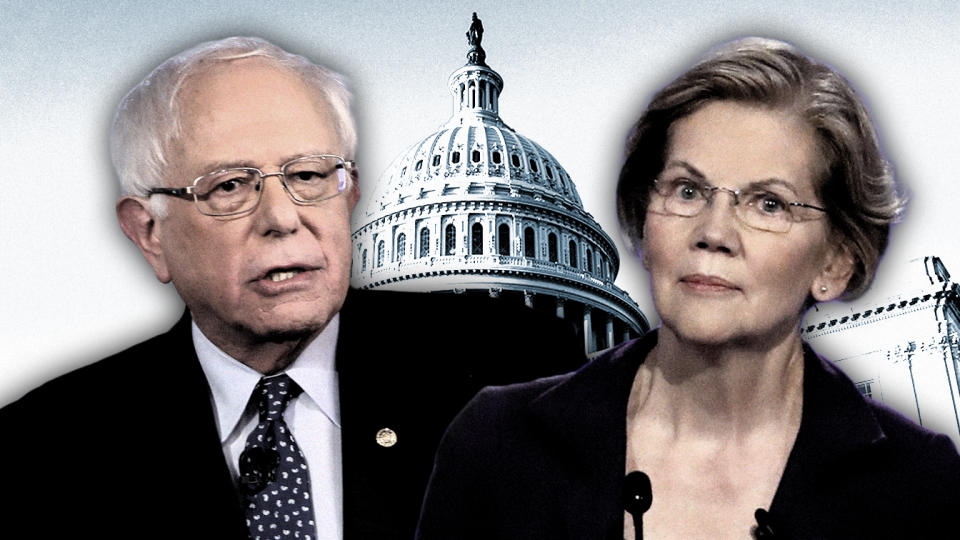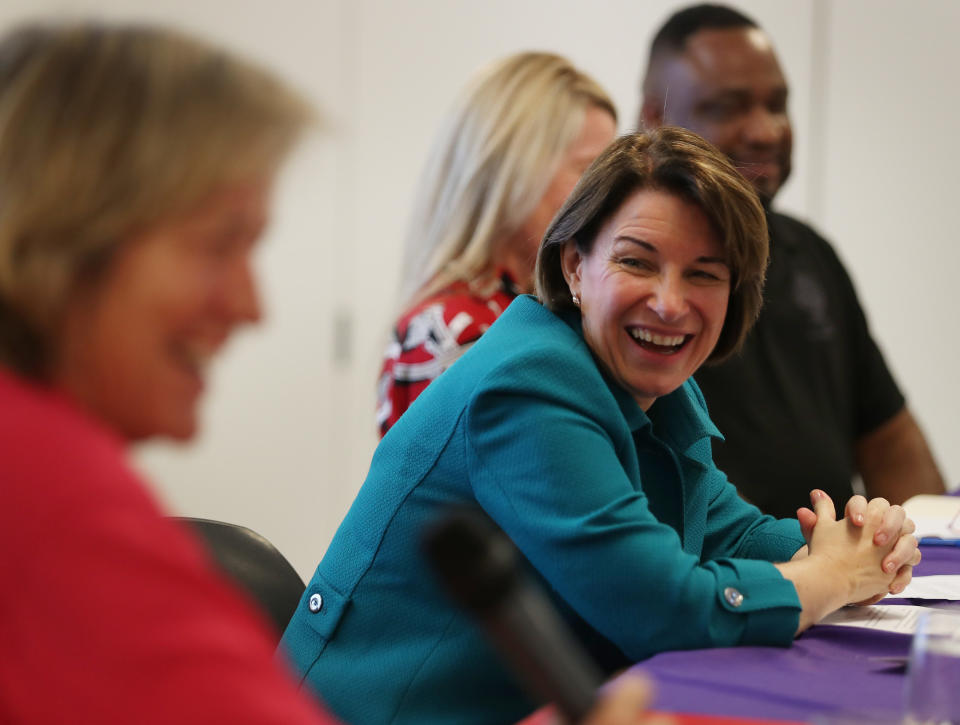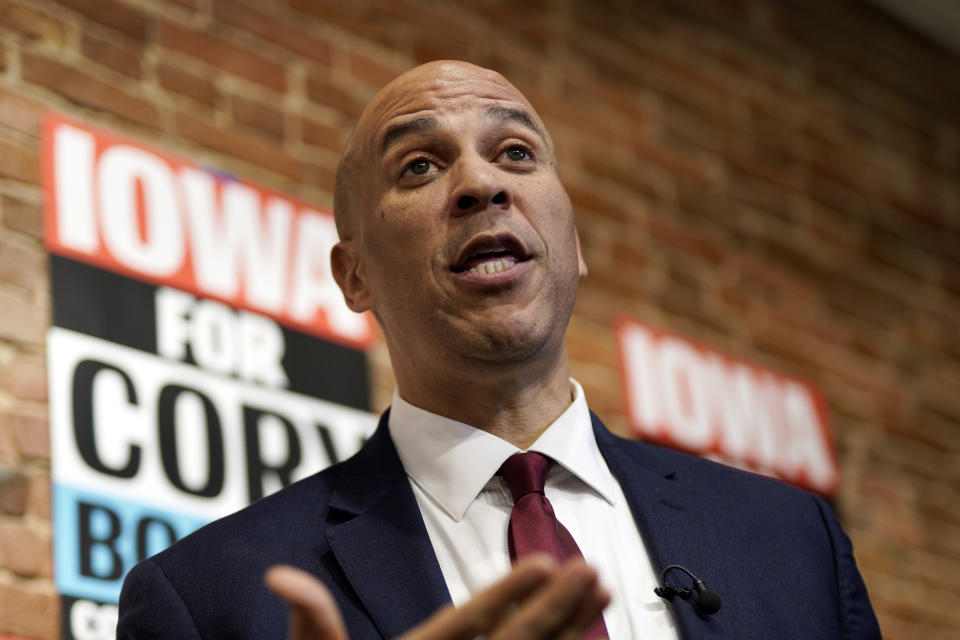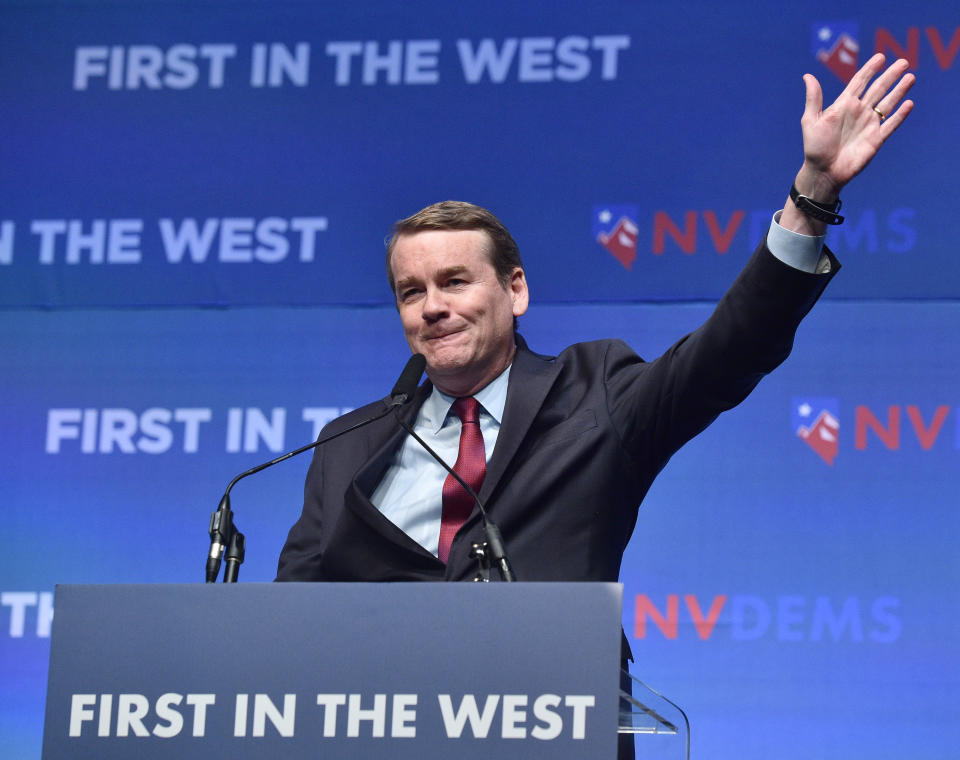The impeachment trial could keep senators in D.C. at the height of the campaign. How Warren, Sanders and others plan to survive.
Welcome to 2020 Vision, the Yahoo News column covering the presidential race with one key takeaway every weekday and a wrap-up each weekend. Reminder: There are 47 days until the Iowa caucuses and 321 days until the 2020 election.
It’s not unusual for senators who have decided to pursue a new career as president to shirk some of their old duties on Capitol Hill. They skip votes to fry steaks in Des Moines. They shake hands in Nashua instead of introducing new legislation.
But an impeachment trial is different.
Assuming the House of Representatives votes Wednesday to impeach President Trump, the process will proceed to the Senate for only the third time in American history. The rules say that to participate — and ultimately, to vote on Trump’s fate — senators must sit attentively at their desks every afternoon except Sunday.
That means that for the duration of the trial, the five Democratic senators currently running for president — Elizabeth Warren, Bernie Sanders, Amy Klobuchar, Cory Booker and Michael Bennet, all of whom have confirmed that they intend to take part — won’t be able to campaign in Iowa, New Hampshire or anywhere else, and they won’t have much free time to raise money either, by phone or in person.

It could be a make-or-break moment. With the Iowa caucuses on Feb. 3 and the New Hampshire primary on Feb. 11 — and Nevada and South Carolina following later that month — all of the Democratic candidates have been counting on spending January crisscrossing the early states, delivering their closing arguments.
Now only some of them will be able to: Former Vice President Joe Biden won’t have anywhere else to be, and neither will South Bend, Ind., Mayor Pete Buttigieg. (So far, his day job as the chief executive of the Hoosier State’s fourth-largest city hasn’t appeared to interfere with his presidential ambitions.)
But Warren, Sanders, Klobuchar, Booker and Bennet will be stuck. Never before has a group of sitting senators simultaneously served as jurors in the impeachment trial of an incumbent president while also running to replace him in the White House. How they handle this unprecedented challenge could change the course of their campaigns, for better or worse.

Theoretically, they could decline to participate. In fact, that’s what entrepreneur Andrew Yang suggested during a recent conversation with reporters on his campaign bus: that his rivals who are senators simply forgo the trial and instead work to maintain their momentum by remaining on the trail in Iowa and other early states.
Yang brushed off the possibility that potential primary challengers or members of the GOP could weaponize a senator’s absence. “The fact is, they can get briefed on anything they miss,” he said, although that would disqualify them from voting. “They’re running for president. We have to create a positive vision for the country ... and sitting in a Senate chamber listening to arguments that we’ve already heard in many respects, and you know which way you might vote, [won’t be fruitful]. The other brutal fact is that we need 20 Republican senators to cross party lines and vote for impeachment. So the odds of Cory or Bernie or Senator Warren or Michael being the key and deciding vote are vanishingly low.”
Meanwhile, Republican Rep. Jason Smith of Missouri has introduced legislation recommending that any senator running to challenge Trump recuse himself or herself from the trial.
Yet failing to show up for such a historic event — a decision that would leave senators open to accusations that they are ditching their constitutional duties — seems to be a nonstarter. “The Constitution doesn’t have recusal,” Warren said Sunday in Iowa. “I swore an oath to uphold the Constitution of America, and that is exactly what I will do.”
“I guess I’m just going to have to try to be in Washington, D.C., in Des Moines, Iowa, and Concord, N.H., at the same time,” Sanders dejectedly told ABC. “I will do my best.”
“This is about whether or not presidents get to decide on their own that they can advance their own interests and their own political futures and use the United States’ taxpayers’ money as bait,” Warren added Sunday. “I believe that is wrong, and the remedy for that is an impeachment proceeding, so I’ll be there.”

The question then becomes how the candidates will adjust their January game plans to minimize the impact of what are likely to be long absences from the trail — and perhaps even capitalize on new opportunities for exposure from their center-stage perches in D.C.
A Booker campaign aide told Yahoo News the team will have to “get creative” when their boss is unable to travel. Strategies include tele-townhalls, Skyping into major party events and sending surrogates to early states. The campaign will also try to have Booker return to the road on weekends to squeeze in at least some crucial face time with voters.
According to the aide, Booker’s campaign will devote far more energy to campaigning in the early states than to orchestrating made-for-TV moments on Capitol Hill. But the aide also noted that the trial “definitely could” give Booker some welcome national exposure. Booker will not be able to speak during the proceedings — the trial is run by the House impeachment managers and the president’s defense lawyers, and senators must submit any questions in writing to Chief Justice John Roberts, the presiding judge — but he will almost certainly attract more media attention as a result of his dual status as juror and presidential aspirant, a platform not afforded to candidates who aren’t senators. Whether the brighter spotlight helps Booker improve in the polls — he didn’t qualify for Thursday’s debate in Los Angeles — remains to be seen.

It’s possible that Klobuchar and Bennet could benefit as well; both have already spent months on the trail, and neither has ever approached top-tier status. Yet for better-known candidates such as Sanders and Warren, who already enjoy near-universal name recognition, the potential upsides of increased exposure are smaller. That’s where campaign surrogates come in.
Sanders has a potential advantage here: New York Rep. Alexandria Ocasio-Cortez, the high-profile Democratic celebrity who has endorsed the Vermont senator. As Sanders spends time on the Hill, Ocasio-Cortez will be able to stump for him, as she has done in Iowa, attracting new followers to the campaign. She recently told BuzzFeed News she has thought about taking on that role.
“You know, it’s certainly a consideration,” Ocasio-Cortez said. “I haven’t made any hard commitments, but ... I think it’s a possibility and it’s certainly something that I’m open to.”
Republicans seem to enjoy watching so many of Trump’s potential 2020 opponents squirm. In November, the Washington Post reported that despite earlier GOP calls for a swift, pro forma Senate process, Republican senators and their advisers were “privately discussing whether to pressure GOP leaders to stage a lengthy impeachment trial beginning in January” in order to “scramble the Democratic presidential race.”
“That might be a strategy,” Wisconsin Sen. Ron Johnson told the Post, flashing what the paper described as a “coy smile.”
To put the GOP’s timeline in perspective, Bill Clinton’s impeachment trial lasted about five weeks. If Trump’s goes that long, Warren, Sanders, Klobuchar, Booker and Bennet will still be trapped in Washington, D.C., on the day of the Iowa caucuses.
Download the Yahoo News app to customize your experience.
Read more from Yahoo News:





